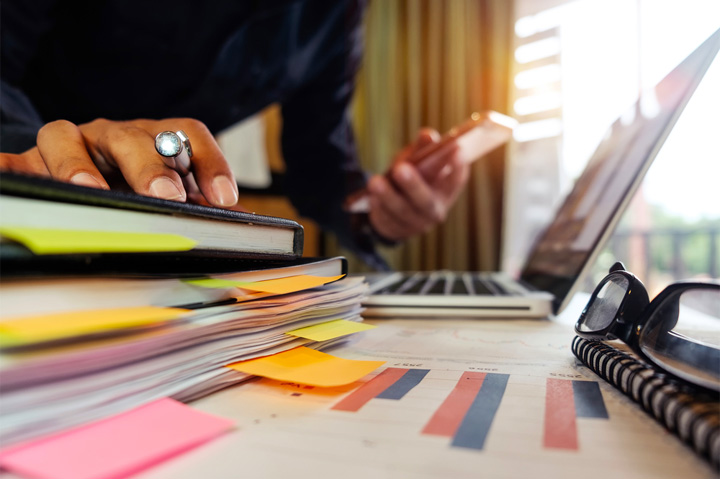5 Tips to Stay Organized in the Office
Clutter can increase stress levels and hinder productivity. Try these strategies to optimize your workspace.
The influx of unread emails and unorganized desk drawers filling up your office may be a bigger deal than you think.
Clutter can actually increase stress levels, take a toll on relationships and make it difficult to focus and be productive. On the other hand, when organization in the office is prioritized, it’s easier to complete tasks, be more efficient and excel in the workplace.
But let’s face it: When the environment is fast-paced and the emails are never-ending, or if you’ve fallen out of the in-office rhythm after working from home for so long, disorganization is likely.
To avoid getting overwhelmed, treat maintaining an organized office space like an ongoing project. Little by little and with these five tips, getting – and staying – organized can be accomplished.

1. Clean Your Office
Before any true organization can begin, a thorough purge of your office space is necessary. Throw away anything you haven’t touched in months. Shred or delete outdated documents that you don’t need any more. And lastly, toss out any duplicate files and items.
If you think you need the three staplers and the cup full of pens on your desk, you don’t. Instead of throwing these functional duplicates away, try giving them to coworkers or donating them.
2. Establish Work Zones
The best way to maintain organization in your newly decluttered office space is to establish zones. You likely have about three different areas in your workspace: a primary working area (desk and computer), a reference area (filling cabinets and binders) and a supply area (shelves, closets and drawers).
Once you identify these zones, redistribute everything in your office into their respective zones and label them. Use drawer organizers for the small items like paper clips, pens and tacks.
You could even designate a section of your desk as a “landing pad.” The landing pad is the one and only place that you’re allowed to put random items. Everything else has to have a home.
3. Sort Your Email
In Slack’s State of Work study, it found that the most highly engaged knowledge workers – people who holds an office position, work with data, analyze information or think creatively for their job – receive an average of 50 to 100 emails a day. It can feel overwhelming, but there are ways to get ahead of the inevitable cluttered inbox.
Consider scheduling 10 to 20 minutes during your day to go through emails and delete, reply to or archive messages.
As soon as you get an email, try to sort it. Place it in a created folder or category for projects, people or specific actions required. Folders are like drawers, and categories are like color-coding your emails.
Starring, flagging or putting priority labels on important emails allows you to visually distinguish them and helps you remember to review or reply later.
4. Time Block Your Day
Designating time for specific tasks and scheduling quiet time will help your day progress more effectively. If you notice you often end your workday with incomplete tasks, try timing how long it takes you to do assignments. Maybe you’re spending too long checking emails?
Using time blocks as a guide also allows you to see any flexibility you have for last-minute requests.
5. Keeps Lists, Calendars and Planners
Research on the psychology of goal-making and to-do lists reveals that unfulfilled goals can interfere with further achievement. However, simply planning how to reach a goal can help your mind focus on other projects.
Taking about 15 minutes each day to make a list of what you need to do, what’s a priority and what’s due will allow for a more productive workday. It’s best to organize these lists based on urgency so you’re prioritizing what needs to be done first.
An email calendar or physical planner promotes organization in the same regard, keeping you aware of the meetings, assignments and due dates you have coming up.
Staying fully organized in the office also means creating practices to facilitate mental organization. Remember, mess equals stress and stress can ultimately hinder productivity.